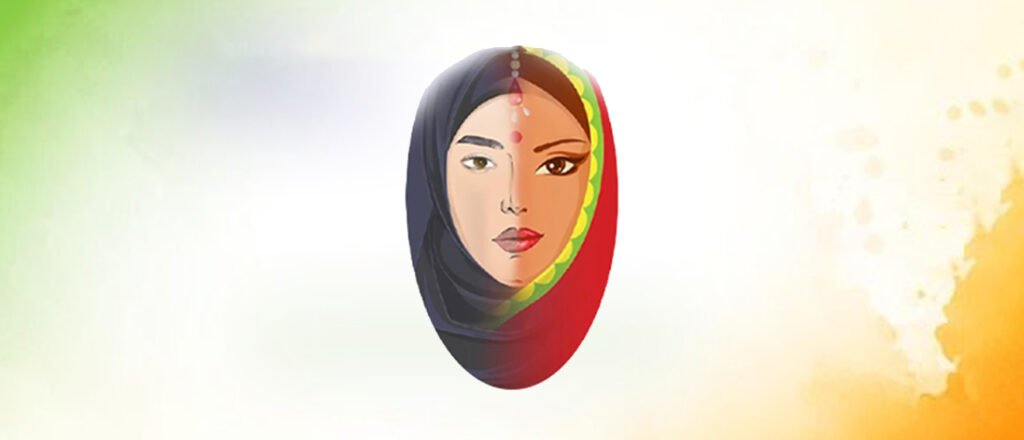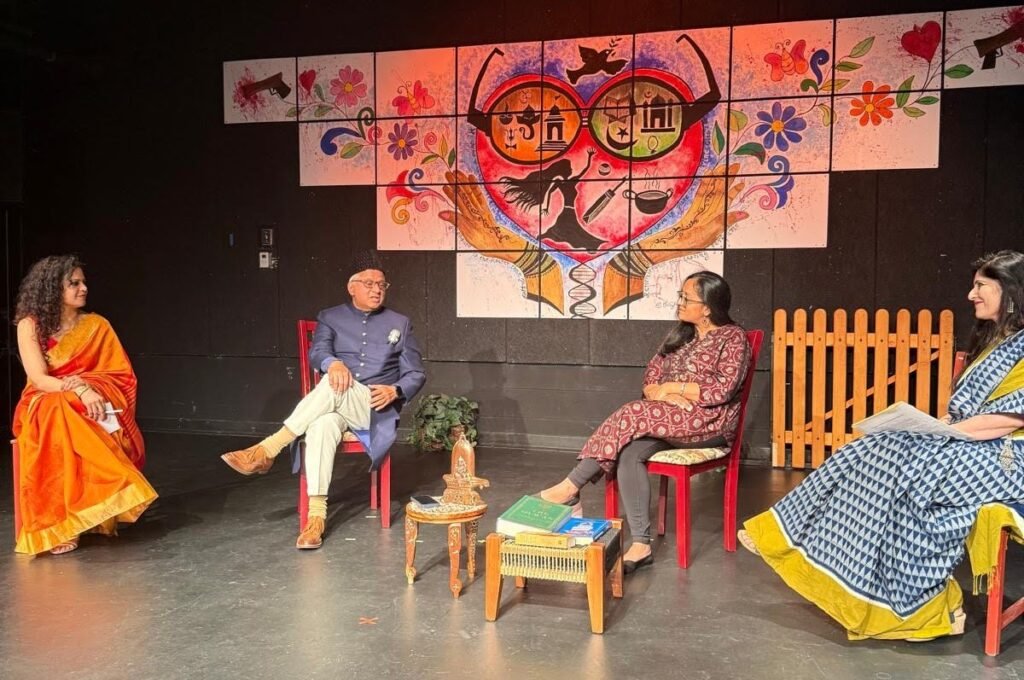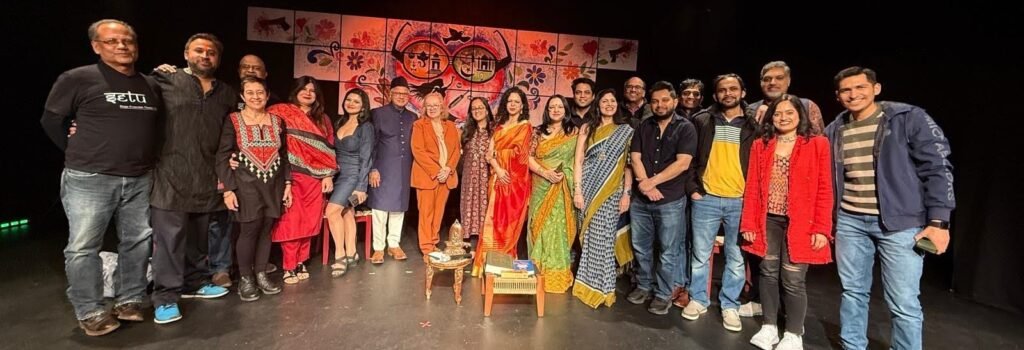
Interfaith Marriages – A Reality Many Parents Struggle With
Interfaith marriages are becoming increasingly common, yet many families find them difficult to accept. Some parents outrightly reject their child’s decision to marry outside their faith, while others—both Muslim and Hindu—use emotional blackmail, saying, “If you marry that person, it will be over my dead body.”
One Hindu parent lamented, “I raised my daughter to be a good Hindu. How could she marry a Muslim? He will force her to convert, or vice versa.” Another parent, a doctor, expressed despair, “I put my son through the best schools, and now he tells me he is gay. I don’t want my lineage to end with me.”
These sentiments are all too common, highlighting the deep-rooted resistance to interfaith marriages in many families.
SETU Presents “When Gandhi and Mohammed Meet” – A Must-Watch Drama

The SETU group is breaking new ground by addressing the complexities of interfaith marriages, particularly between Hindus and Muslims. The play, written and directed by Subrata Das, features realistic dialogue and an impactful screenplay that perfectly captures the struggles faced by couples and their families.
The drama revolves around Neel Gandhi from London and Mohammed Aslam from New Delhi, who meet at a scientific conference in Bangalore. Both face intense opposition from their families regarding their interfaith marriages. This gripping play explores the religious divide within Indian society and beyond, culminating in a surprising twist that questions artificial barriers and emphasizes our shared humanity.
About the Show
- Realistic Depiction – The emotional turmoil, resistance, and challenges faced by couples in interfaith marriages are portrayed authentically.
- Strong Performances – Watching the actors from just a few feet away makes their expressions and emotions even more powerful.
- Social Relevance – The drama reflects real-life struggles, making it highly relatable for anyone who has experienced or witnessed interfaith marriage conflicts.
- Expert Panel Discussion – The post-show discussion with experts like Dr. Patel and Dr. Mike Ghouse provides deeper insights into the challenges and solutions.
If you want to understand modern societal challenges and their impact on interfaith marriages, this play is a must-watch.
Interfaith Marriages – Breaking Barriers Across Religions
For over 15 years, I have officiated more than 500 interfaith marriages, including 150 between Hindus and Muslims. I have spent countless hours speaking with parents, seeking their approval and blessings. Over time, many of them come to appreciate the beauty of blending two faiths, whether through Nikah or Vivah.
In this play, Nadia faces intense pressure from her parents, while her partner Neel encounters threats from his family. On the other hand, Aslam, who loves a Hindu girl, suffers severe harassment, including death threats. These are real-life experiences that many couples go through.
The show is inclusive and addresses a crucial question: If Hindu parents can be complex, so can Muslim parents; they are mirrors of each other. The show captures this beautifully, showing that the challenges in interfaith marriages are universal among all Desi parents, irrespective of their religion or culture.
Many also express interest in a mini-workshop on pluralism. Over the past 15 years, 40,000 guests have left these weddings with new perspectives, shedding their biases toward others and feeling a sense of freedom.
The Play Raises Thought-Provoking Questions
Throughout the performance, the audience was presented with pressing questions that many interfaith couples and their families face:
- What is the need for a knowledgeable officiant? – How can a well-informed officiant help bridge religious and cultural differences in an interfaith marriage?
- Why does religion create barriers between two people in love? – Is faith meant to divide or unite people? What makes religious differences seem insurmountable?
- Can a Muslim woman marry a non-Muslim? – What are the societal and religious perspectives on this issue? How do different families react?
- How can one design a memorable marriage ceremony that respects both faiths? – Is it possible to create a harmonious wedding that blends both traditions while honoring the couple’s love?
- Is passing on our culture and traditions the trickiest aspect to navigate in interfaith marriages? – How do couples manage cultural expectations while building a shared future?
Sugandha Gopal and Gitanjali Srivastava posed challenging questions, followed by inquiries from the audience. Both Dr. Patel and I did our best to provide thoughtful answers.
The SETU production does not attempt to provide definitive answers but instead sparks important conversations about interfaith marriages—conversations that need to happen in every community.
A Message of Love, Unity, and Pluralism
In my journey across 50 cities in the US, Canada, Mexico, and the UK, I have met countless families struggling with the idea of interfaith marriages. What I have learned is simple:
💡 Love transcends religion, caste, and ethnicity.
SETU’s play beautifully captures this truth. It shows that whether Hindu or Muslim, parents react in similar ways—with fear, resistance, and emotional turmoil. But when given time and understanding, many realize that what truly matters is the union of two souls, not religious differences.
What does God desire? He designed (programmed) the universe to exist in harmony but left our interactions with fellow humans unprogrammed. He has blessed us with freedom, which can foster harmony between couples, families, and communities—or lead to conflict.
The March 15th show will feature an insightful discussion with Dr. Dilip Amin, a well-known interfaith marriage counselor. I highly encourage you to attend and gain new perspectives on this sensitive yet crucial issue.
Final Thoughts – Why “When Gandhi and Mohammed Meet” Matters

This drama is more than just a play—it’s a reflection of society’s struggles with interfaith marriages. It encourages meaningful conversations, challenges long-held beliefs, and ultimately promotes understanding and acceptance.
Whether you are a couple facing opposition, a parent grappling with change, or someone interested in cultural and religious dynamics, this play will leave you deeply moved and enlightened.
📍 For tickets and more details, visit: SETU Website
🎭 For upcoming shows, visit: Mosesian Arts
About the Author
Dr. Mike Mohamed Ghouse is an interfaith wedding officiant, speaker, author, and social scientist. He is the founder of the Center for Pluralism and director of the World Muslim Congress.
🔗 Learn more about his work: Dr. Ghouse Profile

